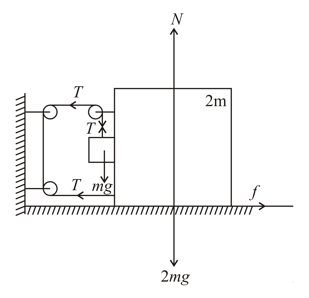BM Sharma Solutions for Chapter: Newton's Laws of Motion II, Exercise 4: DPP
BM Sharma Physics Solutions for Exercise - BM Sharma Solutions for Chapter: Newton's Laws of Motion II, Exercise 4: DPP
Attempt the free practice questions on Chapter 7: Newton's Laws of Motion II, Exercise 4: DPP with hints and solutions to strengthen your understanding. Chapterwise/Topicwise Daily Practice Problems (DPP) Mechanics I JEE Main & Advanced solutions are prepared by Experienced Embibe Experts.
Questions from BM Sharma Solutions for Chapter: Newton's Laws of Motion II, Exercise 4: DPP with Hints & Solutions
A force, is applied to a block as shown in figure, where is time in . The force is applied at when the system was at rest. Which of the following graph correctly gives the frictional force between and horizontal surface as a function of time ?
(Assume that at , tension in the string connecting the two blocks is zero).
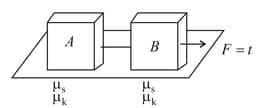
With reference to the figure shown, if the coefficient of friction at the surfaces is, then the force required to pull out the block with an acceleration of will be,
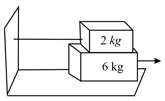
The coefficient of friction between and blocks is and between block and ground is, respectively. Choose the correct statements.
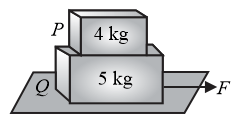
A block with mass is resting on another block of mass As shown in figure, a horizontal rope tied to a wall holds it. The coefficient of friction between and is while coefficient of friction between and the ground is The minimum required force to start moving will be
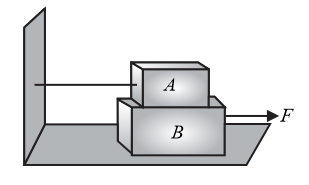
A body lies on a smooth horizontal table and another body is placed on . The coefficient of friction between and is . What acceleration given to will cause slipping to occur between and ?
A slab rests on a frictionless floor and a block rests on the top of the slab. The static coefficient of friction between the block and slab is while the kinetic friction is . The block is acted upon by a horizontal force . If , the resulting acceleration of the slab will be,
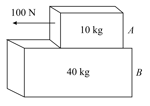
In the figure, The coefficient of friction between and ground is , between and ground is , between and is . is pulling the string with the maximum possible force without moving. Then, the tension in the string connected to will be
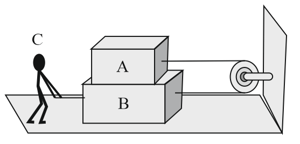
In the system shown in figure the friction coefficient between ground and bigger block is There is no friction between the blocks. The string connecting both the blocks is light; all three pulleys are light and frictionless. Then the minimum limiting value of so that the system remains in equilibrium is
